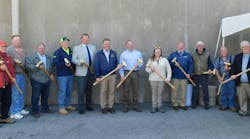At the opening ceremony of WEFTEC.06 in Dallas, Texas, Hank Driesse, senior vice president and president of ITT Fluid Technology, said, "WEFTEC is an important meeting place and trade show for the water and wastewater industry. You should view ITT's Platinum Sponsorship and presence here at this show as a reflection of our commitment to the industry and to the global water issues. As you know, ITT is deeply involved in the cycle of water use and reuse and committed to sustainable development and utilization of the world's water resources. Through the efforts of its scientists and engineers and the use of ITT's products and systems, it plays an important role in the management of this vital natural resource."
Early on, ITT recognized the need for broad-based applications and new technology and began to expand its core competencies beyond the pump industry. Today, ITT is the largest pump producer in the world. To meet the demands of the changing water market, ITT focused on developing and integrating innovative technologies in such areas as biological treatment, monitoring and control instrumentation, membrane filtration, desalination, and UV and ozone disinfection.
At WEFTEC, ITT is demonstrating its capabilities through its well-known product brands: Flygt, Goulds Pumps, Lowara, Wedeco, Aquious and Leopold, which was acquired in June of this year.
Source: ITT

